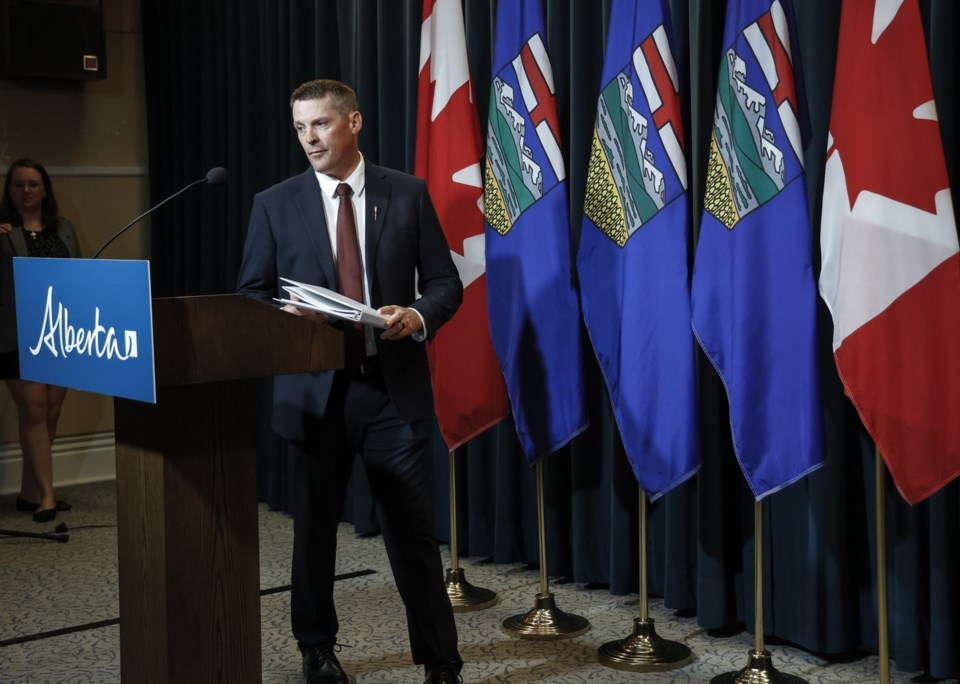The final numbers are in on last year's Alberta budget, and the bottom-line figure is an $8.3-billion surplus.
It's $2.5 billion more than officials had expected to get, and Finance Minister Nate Horner told reporters Friday the jump is because of more tax revenue from a growing population, coupled with oil royalties that were higher than expected.
Speaking in Calgary, Horner said a little more than $5 billion of the surplus is cash the province can spend, and the government will split it between its rainy-day Heritage Fund, paying down debt and savings.
End-of-year reports issued by the province say non-renewable resource revenue totalled $22 billion in the last fiscal year, with bitumen royalties alone making up more than $17 billion.
Overall resource revenue was close to $5 billion more than budgeted, though the reports say the benchmark North American price of oil — West Texas Intermediate — averaged just US$0.34 cents higher than the US$74 per barrel Alberta had forecasted.
Bitumen production was up almost 40 per cent compared with the previous year, while crude oil production was up nearly 10 per cent.
Another factor behind the surplus is Alberta receiving some of its share of the $32.5 billion class action settlement reached in March against three major tobacco companies.
The settlement, which closed out a decades-long court battle, means provinces and territories are receiving billions of dollars to recoup smoking-related health-care costs.
Alberta's total share is $3.1 billion, and government officials said the province is receiving a $713 million lump sum payment to start.
Horner said no plans were in place to put the settlement funds toward health-related expenses or initiatives, saying the province is essentially being paid back for dollars it already spent.
"It improves our overall cash surplus, which helps us in many fronts," he said. "Our year-end results are solid and the surplus is good news."
However, the good times are not expected to last.
Horner’s current budget for the fiscal year that began in April is expected to end next spring with a $5.2-billion deficit, with more multibillion-dollar deficits in the years after that.
In February, when this budget was tabled, Horner said the red ink was expected because of volatile oil prices, tax cuts and global events, such as the trade tariffs imposed by the United States.
Those factors, especially steeper tariffs from U.S. President Donald Trump, could push Alberta's deficit come March to nearly $9 billion, according to government calculations earlier this year.
Earlier Friday, Trump said he was ending all trade talks with Canada over its digital services tax, which is to come into effect next week and hit tech giants like Amazon, Meta and Google with a three per cent tax on revenue generated through Canadian users.
Trump called the tax, which is to be retroactive to 2022, "a direct and blatant attack" on his country and that he would announce a retaliatory tariff measure on Canada in a matter of days.
Horner said Trump's sudden move was a "great example" of the uncertainty that's clouding potential investments and pushing his province into deficit territory.
"We're not going to create more jobs and be all that we can be with this hanging over our heads,” he said.
Opposition NDP finance critic Court Ellingson told reporters the timing of the surplus was opportune considering Trump’s comments, but said he's concerned the province won't take advantage of the opportunity it has with the surplus to shore up key services.
"We have a government that is falling behind in health-care investments, falling behind population growth and inflation, and we haven't heard the government talk about how they're going to be making strategic investments in those areas," Ellingson said.
Ellingson also said he was concerned Horner had no clear plan to get Alberta out of deficit in the years to come.
Horner said Alberta's dependency on resource revenue means the best financial planning that can be done is ensure forecast oil prices are conservative.
"Over time, that will allow the province to be in a surplus position more often," he said.
This report by The Canadian Press was first published June 27, 2025.
Jack Farrell, The Canadian Press



